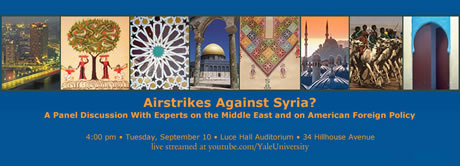
At the crux of the Syrian crisis – when the United States was deliberating whether to strike Syrian military targets in response to an August 21 chemical attack – the Council on Middle East Studies (CMES) hosted a panel of five international relations experts on September 10 to analyze the path forward.
The panelists included Professors Ellen Lust, Charles Hill, Hassan Barari, and Emma Sky, along with World Fellow Mohamed Elfayoumy. Frank Griffel, CMES Chair, introduced the panelists, who then launched into opening remarks.
While Lust did not think that the attack had changed the parameters of the war – it was not the first usage of chemical weapons nor a change in the balance of the Syria conflict – she believed it changed the players in the game.
“It became the biggest point in the crisis because the line drawn in the sand was crossed,” she said. “This was an issue of credibility. It changed the diplomatic game. It also suddenly became a domestic issue.”
Lust laid out the three scenarios that could play out: a strike followed by a strong backing of rebels; no military action; or a diplomatic solution.
In the first scenario, she warned that American involvement could delegitimize the rebels due to strong anti-American imperialist sentiment in the region. However, the second scenario, she said, would be kicking the can down the road. “Conflicts never get easier to resolve,” she added.
Elfayoumy, who is the Egyptian representative to the Syrian Opposition, was more blunt. “If you just remove chemical weapons and leave the killing, you’re not doing good,” he urged. “There is no moral justification based on getting rid of chemical weapons alone. There must also be an end to the suffering.”
The discussion gradually moved from strategy inside Syria to the broader political ripples of American involvement.
“In the case that America hits and hits hard, a Pandora’s box will be opened,” Barari said. “Iran will feel most threatened and may activate Hezbollah to open another front against the Israelis. At the same time, American allies would feel assured.”
He went further to explore a possible counterinsurgency, sponsored by Iran, in the case that the regime appears close to a collapse.
Similarly, Hill explored the foreign ramifications of the crisis, but from a Russian perspective. He read a newly leaked telegram, sent from Tehran to Moscow, that addressed Putin. The telegram celebrated American ambivalence toward intervention, hailing the emergence of a new “troika” of power: Russia, Iran, and China.
The panelists also addressed the domestic tensions erupting in the United States and the United Kingdom over the intervention. Sky spoke about how Iraq still cast a shadow over the British Parliament’s vote, which was also shaped by a skeptical public who has more access than ever to information.
